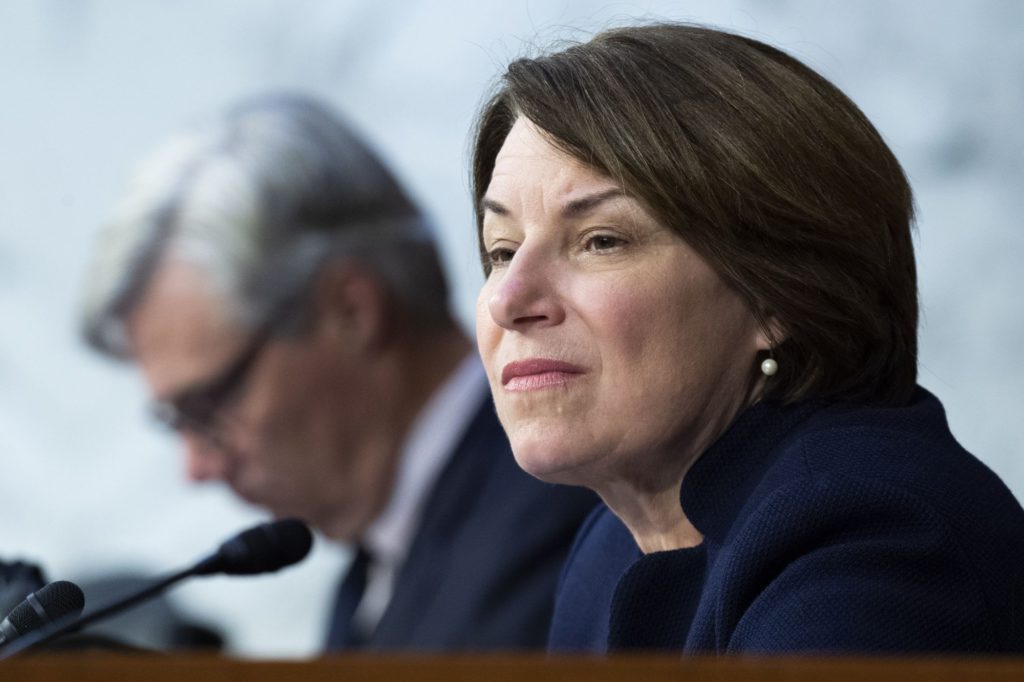(Bloomberg) — A bipartisan group of lawmakers defended a bill to rein in big technology companies, signaling that momentum is building for the first major piece of legislation to curb the power of giant online platforms.
Senators Amy Klobuchar and Chuck Grassley and Representatives David Cicilline and Ken Buck in a Wednesday press conference addressed concerns brought up by tech groups and their supporters about a measure that would prohibit companies like Apple Inc., Amazon.com Inc., Alphabet Inc.’s Google, Microsoft Corp.
and Facebook parent Meta Platforms Inc. from favoring their own products over those of competitors.
“For too long, big tech companies have said ‘just trust us’ while putting profits ahead of their users,” Klobuchar said.
“We’re coming together to say the era of ‘just trust us’ has ended.”
The bill, which is sponsored by Klobuchar, a Minnesota Democrat, and Grassley, an Iowa Republican, would prohibit companies from giving an advantage to their own products over those of smaller competitors that depend on their platforms.
“This is the best way to address the problems of big tech’s power over what we buy, what we see, what we read, what we say online,” said Grassley.
The appearance of the bipartisan pairs of Senate and House lawmakers at a joint press conference about a bill aimed at putting guardrails on tech giants was unprecedented, indicating the rising stakes involved in moving the controversial measure forward.
Tech giants and industry groups argue that the bill would jeopardize cybersecurity and harm popular products like Amazon Prime and Google Maps.
Recently, Amazon attempted to rally third-party sellers in an online forum to oppose the legislation, claiming it would harm business.
The lawmakers denied those concerns, saying the measure would increase innovation through competition, improve national security and wouldn’t eliminate services such as Amazon Prime and Google Maps.
Time is running out for Congress to pass major legislation.
With only seven weeks left before the August recess, lawmakers are facing a barrage of competing priorities, including potential measures on climate change, gun safety, and a package to bolster US competitiveness.
The narrowing window has sparked a flurry of lobbying as industry and consumer groups press their concerns before lawmakers pivot to campaigning for the November midterm elections.
Apple, Amazon, Google and Meta spent $16.7 million lobbying in the first three months of 2022, according to lobbying disclosures filed with Congress, with all four identifying the antitrust bills as their top priority.
Tech-backed trade groups have also opposed the bills.
The Computer and Communications Industry Association spent $22 million last week on broadcast and cable TV ads, according to Ad Impact, and another $2.8 million on Facebook and Instagram ads since the beginning of the year.
The bill is “more focused on advancing a political agenda than promoting competition,” said Neil Bradley, chief policy officer of the U.S.
Chamber of Commerce, which has vigorously attacked efforts by Congress and the Biden administration to toughen antitrust enforcement.
Senate Majority Leader Chuck Schumer has promised to bring the bill to a floor vote in upcoming weeks.
“As long as Schumer is willing to bring it up, I think we’ve got it tweaked so that we can get it moving now,” said Senator Grassley in an interview with Bloomberg News.
“It’s pretty much up to Schumer at this point.”
A number of undecided lawmakers from both parties are facing a flood of lobbying about the measure. Fight for the Future, a progressive tech advocacy group, launched a crowdfund campaign on Monday to pay for billboards targeting Democrats Maggie Hassan of New Hampshire and Michael Bennet of Colorado, saying they should support the legislation and stop “shilling for big tech.”
Senators released a revised version of the bill in May in response to criticism from the tech industry, specifying that it wouldn’t affect subscription services like Amazon Prime and would strengthen protection for the platforms’ cybersecurity.
Tech giants and their trade groups said that the changes aren’t enough to meet their concerns.
A group of progressives and antitrust advocates, alongside Cicilline, led a call earlier this week rallying support for the legislation and asking constituents to reach out to their senators, specifically voters in Washington and California.
The bill was approved by the Senate Judiciary Committee with bipartisan support in January.
The House companion, which was introduced by Representatives Cicilline and Buck, was approved 24-20 by the House Judiciary Committee last June.
More stories like this are available on bloomberg.com
©2022 Bloomberg L.P.











